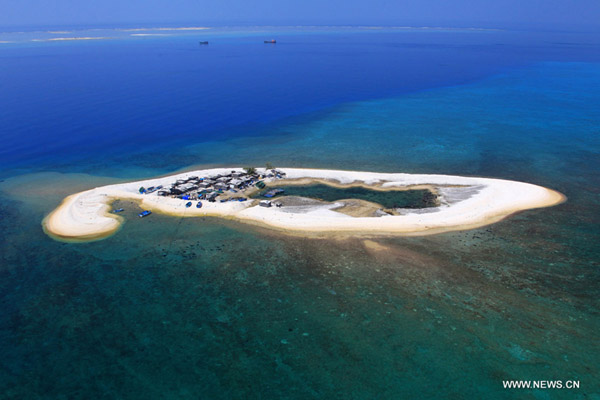
Tensions have risen markedly in the South China Sea recently due to the Philippines repeatedly taking provocative actions — such as sending ships to intrude into China's territorial waters — to challenge China's sovereignty and maritime interests there.
In the latest incident, Manila sent a coast guard ship and a government vessel into the waters adjacent to China's Huangyan Island on April 30 in a premeditated act of provocation, only for the two boats to be expelled by the China Coast Guard, which took professional control measures such as using water cannons to block their illegal entry.
READ MORE: China Coast Guard drives two Philippine vessels off Huangyan Dao waters
Manila has previously made similar confrontational moves, dispatching vessels to send construction materials to the old warship it illegally grounded on China's Ren'ai Reef in 1999, in an effort to reinforce the ship so as to achieve permanent occupation of the Chinese reef.
Yet rather than learning a lesson from its repeated futile attempts to encroach on China's territories, the Philippines has tried to shift the blame onto China, by summoning a senior Chinese envoy in Manila last Thursday to protest what it claims are China's "aggressive actions".
And in order to fool the international community into believing that the Philippines is not a troublemaker, its top leader has claimed that the last thing the country wants to do is to raise tensions in the region.
Yet what his government has been doing belies his words. The main cause of the current tensions between the two countries in the South China Sea is that the Ferdinand Marcos Jr government, encouraged by Washington, has reneged on the common understanding and arrangements it reached with Beijing to manage differences, prevent conflict and build trust.
It is the Philippines going back on the previous "gentlemen's agreement", internal understanding and the agreed "new model" between the two sides — in an attempt to change the status quo — that has created troubles and sparked the current tensions.
This is because the Philippines has accepted the role of being a pawn in the United States' geopolitical game in the "Indo-Pacific" which is aimed at containing China.
ALSO READ: Reneging on agreement inviting trouble to region
On Monday, thousands of US and Philippine troops conducted massive war games off the Philippines' northern coast, which only serves to escalate tensions in the region and highlight its provocative intentions. The drills came shortly after US, Australian, Japanese and Philippine troops held joint maritime exercise in the South China Sea in early April.
For its own good and for peace and stability in the region, Manila should mend its way by adhering to the basic norms of international exchanges, and honoring its commitments on dealing with territorial disputes with China.
It is delusional for the Philippines to believe that the auspices of the US-Philippines Mutual Defense Treaty mean it can make some territorial gains at China's expense.


